| | | | | | | Presented By Babbel | | | | Axios World | | By Dave Lawler ·Oct 28, 2021 | | Welcome back to Axios World. - Tonight's edition is 1,979 words (7½ minutes). Next week's editions will land in your inbox from Glasgow, where I'll be attending the COP26 climate summit.
- Heads up: President Biden will soon touch down in Rome. He'll meet tomorrow with the pope, Italy's president and prime minister and French President Emmanuel Macron. He'll then attend the G20 (Sat.-Sun) and COP26.
New arrival? Subscribe. | | | | | | 1 big thing: Putin exploits Europe's energy crisis |  | | | "From Russia, with love." Putin signs a pipeline in 2011. Photo: Dmitry Astakhov/AFP via Getty | | | | Russia didn't cause Europe's current energy crisis, which has seen natural gas prices spike 5x over last year, but Vladimir Putin seems intent on using it to his advantage. Why it matters: Gas prices fluctuate with Putin's every word (they fell today after he signaled supply would increase next month), and the supply crunch has been an uncomfortable reminder of Europe's reliance on Russian fuel. At least one country, Moldova, is in danger of a very cold winter if Russia turns off the tap. Driving the news: Putin recently dismissed accusations that Moscow is exploiting the crisis as "utter nonsense, drivel and politically motivated tittle-tattle." - The Kremlin has noted that high prices are actually a risk for Russia because countries could turn to other fuels like coal.
- But Putin is no stranger to using gas to serve geopolitical purposes, notes Anna Mikulska of Rice University's Baker Institute, including to increase the dependence of neighboring countries on Russia or to punish countries that move toward the West.
Putin's envoy to the EU, Vladimir Chizhov, hinted earlier this month that geopolitics were indeed a factor. "Change adversary to partner and things get resolved easier," Chizhov said, referring to the way the bloc treats Russia. - Putin has pushed EU countries to agree to longer-term contracts that will keep them reliant on Russian gas but, he contends, guarantee consistent supply.
- And he has claimed that one way to ease the supply crunch would be for Germany and the EU to expedite approval of the controversial Nord Stream 2 pipeline, which circumvents Ukraine (Russian gas giant Gazprom has already been shipping less gas via Ukrainian pipelines).
- The other side: Amos Hochstein, the U.S. special envoy for energy security, dismissed that suggestion, telling reporters on Monday that if Russia has the ability to increase supply, it can do so using existing pipelines.
Between the lines: It's not clear that Russia could actually ramp up supply enough to "decrease the pain in any significant manner," says Mikulska. "But Russia has at the very least been trying to exploit these conditions to push their own objectives." - Asked if Russia was using energy as a weapon, Hochstein said: "I think we are getting close to that line, if Russia indeed has the gas to supply and it chooses not to, and it will only do so if Europe accedes to other demands that are completely unrelated."
- He added: "The only supplier that can really make a big difference for European energy security for this winter is Russia."
The big picture: Russian gas remains a major part of the energy mix in many European countries. - In Germany, for example, two-thirds of natural gas imports came from Russia as of 2018, and Russian gas accounted for 16% of all energy consumption.
- In several countries in Eastern Europe, 100% of natural gas supplies come from Russia.
|     | | | | | | 2. Moldova's gas emergency |  | | | Moldovan President Maia Sandu. Photo: Bernd von Jutrczenka/picture alliance via Getty | | | | No country is feeling the pinch more acutely than Moldova. - The former Soviet republic has a new government that is seeking to turn away from Moscow and toward the West — but has until now been entirely reliant on Russian gas.
- Moldova's contract with Gazprom expired at the end of September, at which point the Russian gas giant raised the price and reduced supply when Moldova refused to pay it.
- The government has declared a state of emergency, said it will negotiate a new contract only if Gazprom lowers its price, and searched frantically for other suppliers — including by sealing a relatively small-scale deal with a Polish firm this week.
Zoom out: The energy crisis has a medley of causes that have little to do with Russia. - Supply tightened due to a cold winter followed by a hot summer.
- Gas production in the EU has long been in decline, and renewables have taken a hit in part due to low winds.
- Asian demand has sucked up much of the global supply of liquefied natural gas, limiting the potential suppliers for EU countries.
The bottom line: Europe will continue to rely more on Russia for gas than any other source, the Baker Institute's Mikulska says, for reasons of capacity, proximity and existing infrastructure. - But rather than locking in long-term contracts with Russia, several EU countries like Poland have sought to diversify their supply or sign shorter-term agreements, Mikulska says.
- She says Putin is in danger of overplaying his hand and undermining any claim that Russia is a reliable partner.
|     | | | | | | 3. COP26: One step forward, two steps back | 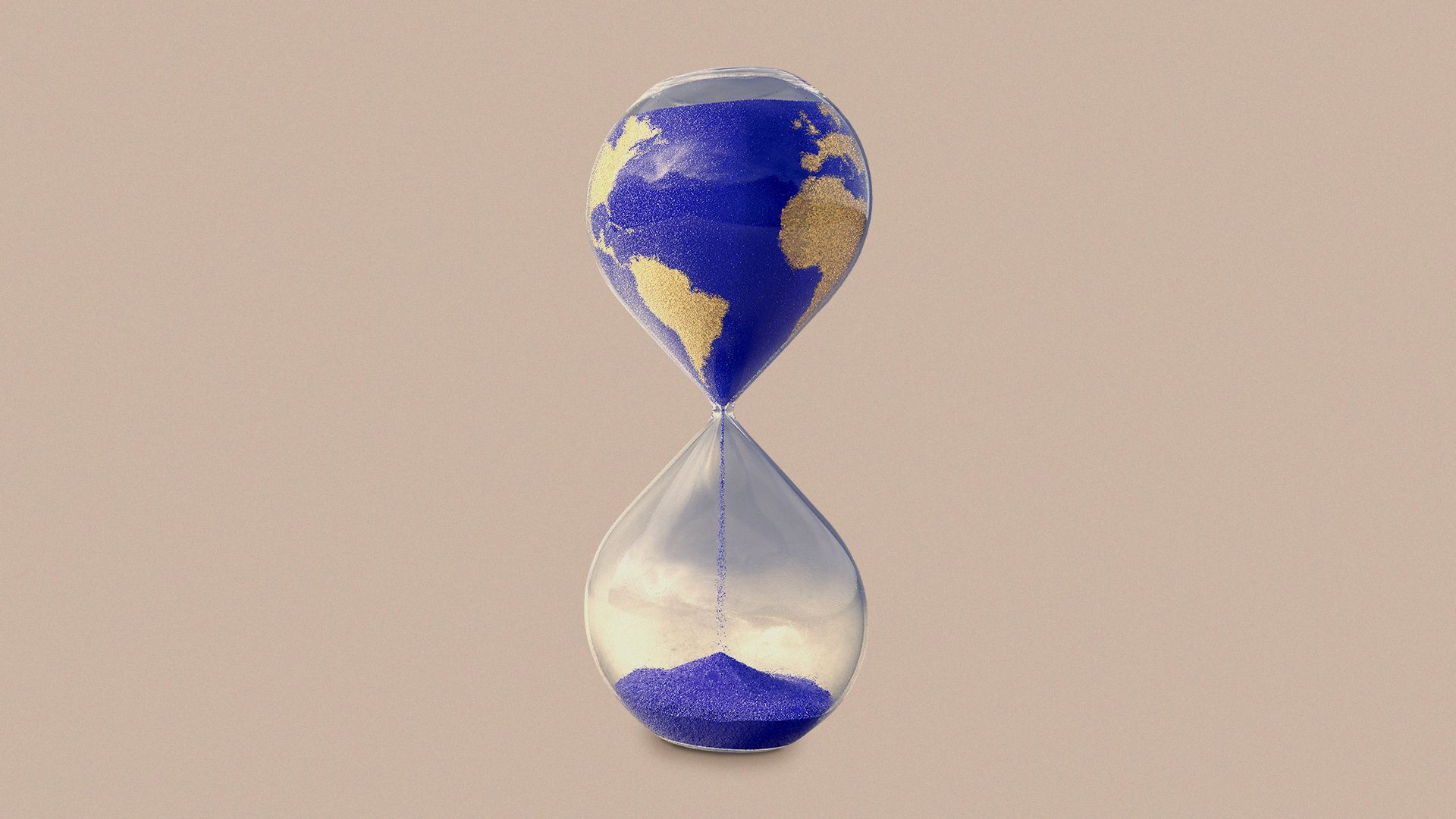 | | | Illustration: Rae Cook/Axios | | | | The run-up to the COP26 summit in Glasgow — heralded as the "last best chance" to change the course of the climate — has been an exercise in expectations setting. - The host, U.K. Prime Minister Boris Johnson, has warned that it's "touch and go" and "might go wrong."
- Alok Sharma, tapped by Johnson to run the summit, said Tuesday that "what we're trying to achieve at Glasgow is in many ways harder than Paris."
Why it matters: The summit is the first time signatories to the Paris agreement have had to submit updated targets aimed at limiting warming to "well below" 2°C and ideally 1.5°C. - The UN estimates that the targets submitted thus far would lead to more than 2.5°C of warming.
Driving the news: The inclusion of $555 billion in climate-related spending today in President Biden's spending bill framework could provide some much-needed momentum heading into the summit. - Yes, but: There were more ominous signals from the world's other top emitters. China unveiled "new" targets today that merely recycled past commitments.
- And India's environment minister rejected calls for a net zero emissions target, noting that developed countries were largely responsible for the crisis and that cumulative emissions were more important than when a country reached net zero.
What to watch: We're looking for announcements at the G20 on funding for developing countries to adapt to climate change, ending investments in coal, and potentially slashing subsidies for fossil fuels, in addition to new targets from India and other G20 members. - The club collectively accounts for 80% of global emissions.
|     | | | | | | A message from Babbel | | 3 reasons to subscribe to Babbel Live | | |  | | | | A Babbel Live subscription lets you: - Enjoy a classroom experience — from home — with top language teachers.
- Get feedback from teachers and just five other students in real-time.
- Take as many classes as you'd like for just one monthly price.
Start learning your way and get 65% off. | | | | | | Bonus: Where in the World | 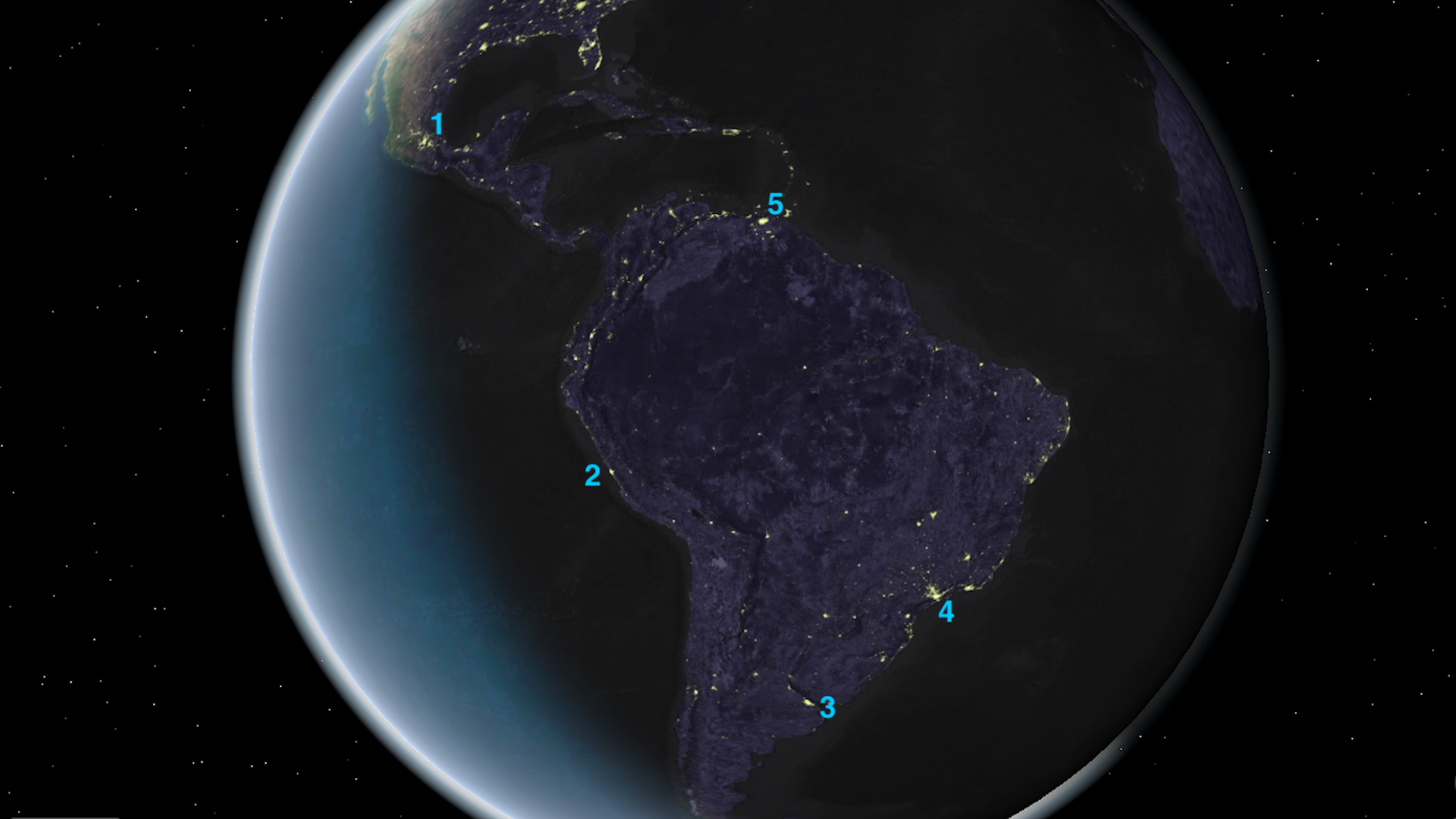 | | | Screengrab via Apple Maps | | | | Same concept as last edition, but we're visiting a new hemisphere this time. Can you name these five cities that shine brightly at night? Full disclosure, I'm not sure anyone is going to get Number 5, which is a bit of a mystery. Scroll to bottom for answer. |     | | | | | | 4. What to expect when Biden meets Macron | 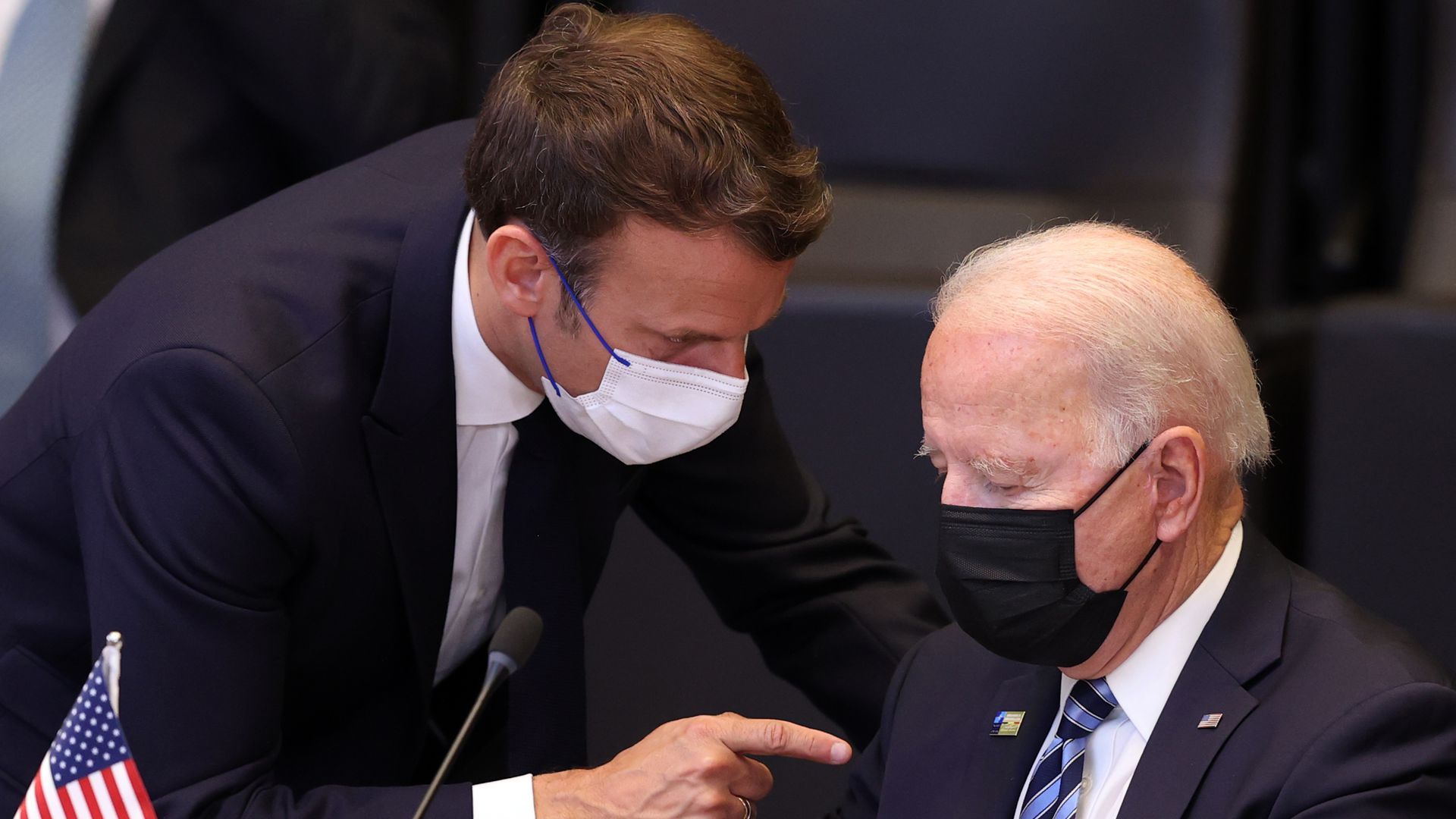 | | | Photo: Dursun Aydemir/Anadolu Agency via Getty Images | | | | Biden's meeting tomorrow in Rome with French President Macron is expected to produce fresh U.S. commitments to European security initiatives, including more investment for counterterrorism forces in Africa, French officials tell Axios' Zach Basu. Why it matters: This will be the first time the two leaders have met in-person since the French declared a "crisis of trust" over the U.S. and U.K.'s secret submarine deal with Australia. What to watch: The meeting will be in Rome, but symbolically on French turf — either at the French Embassy to the Vatican or Italy, or the French-owned Villa Medici. - In addition to endorsing Europe's defense ambitions, the Biden-Macron statement will feature a mutual commitment to better coordination between the two countries, including on shared interests in the Indo-Pacific.
The big picture: The Biden administration has been engaged in a full-court diplomatic press to win back the trust of America's oldest ally, including sending national security adviser Jake Sullivan and Secretary of State Antony Blinken to Paris. - A French official rejected the notion that the wounds had healed in the fallout over AUKUS. "It's not behind us, but we're looking forward," the official told Axios.
Between the lines: Macron is a leading proponent of "strategic autonomy," or the notion that the EU should be able to defend its own interests without having to rely on the U.S. - The U.S. has long been "schizophrenic" on the issue, says Benjamin Haddad of the Atlantic Council, calling on the EU to increase its defense spending while also expressing concerns that new security initiatives could undermine NATO.
- The AUKUS spat, as bitter as the rhetoric has been, has produced a new window to commit to an "ambitious plan" for strengthening Europe's defense capabilities within NATO, Haddad told Axios.
|     | | | | | | 5. Data du jour: Discontent in South Korea | 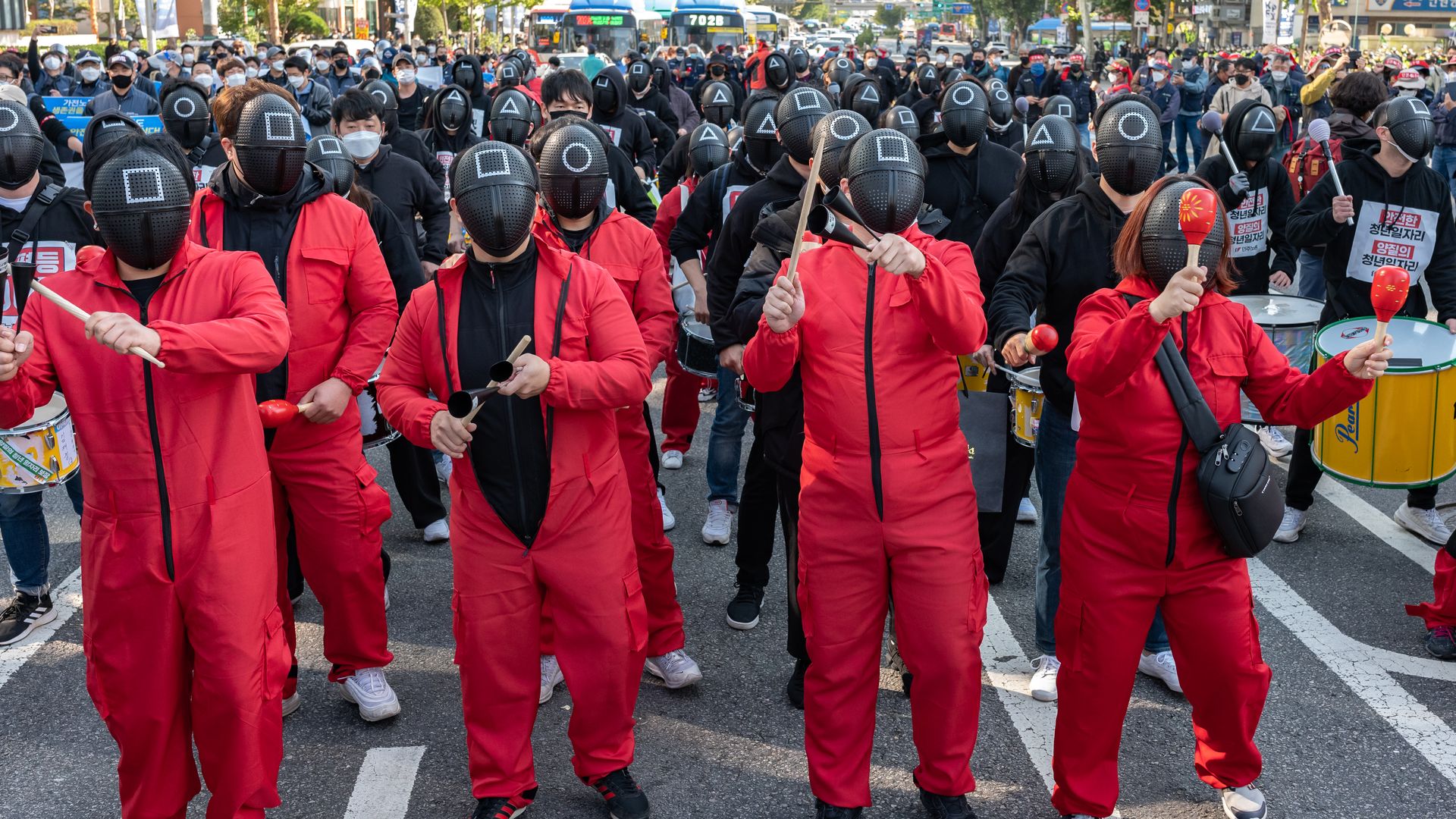 | | | Members of the Korean Confederation of Trade Unions wear Squid Game costumes for a march in Seoul. Photo: Chris Jung/NurPhoto via Getty | | | | A recent Pew poll on political and social divisions within 17 rich countries suggests that those divisions are most pronounced in the U.S., France and South Korea. Why it matters: The societal fractures in U.S. and France have been on vivid display in mass protests, but South Korea faces challenges of its own tied to economic stagnation and inequality. Breaking it down: Americans and South Koreans were by far the most likely to believe society was strongly divided over politics (90% in both). - South Koreans were the most likely to believe there were strong divisions over religion, second only to the French on the urban-rural divide, and near the top in terms of racial and ethnic divisions.
- South Koreans were also among the most likely to believe their political and economic systems need major reforms, alongside the U.S., Italy, Greece and Spain.
Driving the news: South Korean workers recently took to the streets of Seoul dressed as participants in Netflix's "Squid Game" to protest poor working conditions. - The show and another major cultural export, 2020 Best Picture winner "Parasite," speak to the societal divisions many Koreans apparently feel.
|     | | | | | | 6. The unheralded Swiss role in U.S. diplomacy | 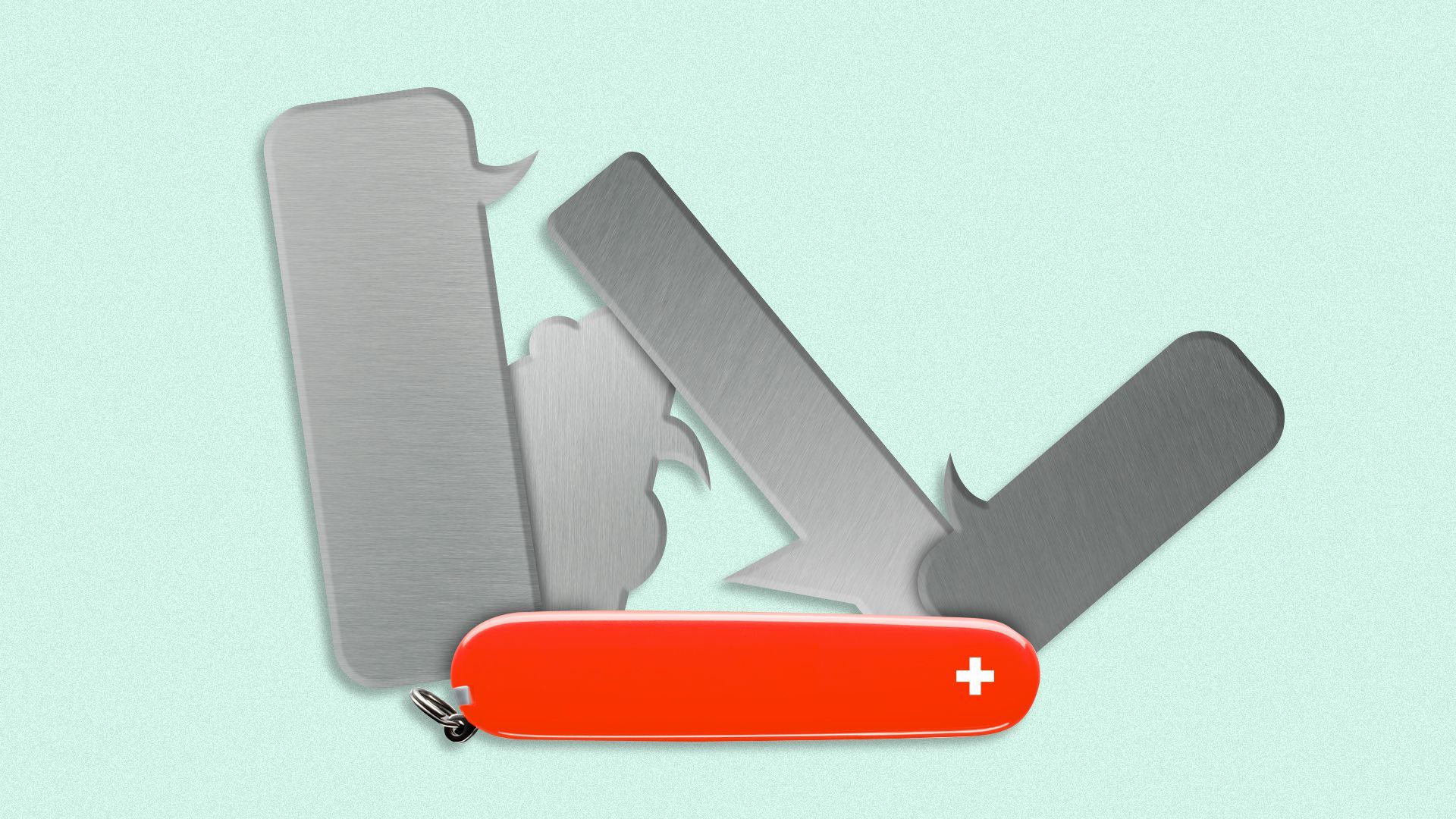 | | | Illustration: Aïda Amer/Axios | | | | When the Biden administration was organizing high-level summits with Russia in June and China in October, it turned to the same country: Switzerland, writes Axios fellow Fabienne Kinzelmann, who is leaving us to return to Zurich. Why it matters: The neutral state at the heart of Europe has long played a larger role in U.S. diplomacy than many Americans realize. - Not only did Switzerland play host to President Biden and Vladimir Putin, and later national security adviser Jake Sullivan and his Chinese counterpart Yang Jiechi, the country also plays a central role in diplomacy between the U.S. and Iran.
- Since the U.S. severed relations with Tehran following the 1979 Iranian Revolution, U.S. diplomatic and consular affairs in Iran have flowed through the Swiss Embassy. The Swiss often serve as an intermediary between the countries.
- It's not just a one-way street. The Swiss hope to negotiate a free trade agreement with Washington, and could also use U.S. support next year as they seek a seat on the UN Security Council for the first time.
Zoom in: Four women on both sides of the Atlantic are currently at the heart of the relationship: Deputy Secretary of State Wendy Sherman; Swiss State Secretary Livia Leu; U.S. Chargé d'Affaires in Bern Eva Weigold Schultz; and Beatrice Schaer, head of protocol at the Swiss Foreign Ministry. - Sherman and Leu developed a friendship in the lead-up to the Iran deal, when Sherman was the lead U.S. negotiator in Geneva and Leu was ambassador to Iran. Leu's first working trip outside of Europe in her current role was to Washington to meet Sherman, and Sherman visited Leu in Switzerland earlier this month.
- Weigold Schultz, meanwhile, is "really in the driver's seat although just being the ambassador ad interim," a Swiss official close to the government tells Axios.
- And Schaer won plaudits for organizing the Biden-Putin summit in just eight days.
Worth noting: The economic relationship is also bigger than you might expect. Switzerland is the seventh-largest foreign direct investor in the U.S. economy, ahead of much larger countries such as France and Spain. Total trade between the two countries amounts to $130 billion per year. |     | | | | | | 7. Stories we're watching |  | | | Evening in Seoul. Photo: Anthony Wallace/AFP via Getty | | | - Iran agrees to resume nuclear talks in November
- Merck to share COVID pill formula with developing countries
- FCC halts China Telecom operations in U.S.
- Brazil senators recommend charges for Bolsonaro
- Blinken protests Israel settlements move in "tense" phone call
- Afghan resistance ups its U.S. lobbying
- U.S. issues first passport with "X" gender marker
Quoted: "I do have faith, given the long-term relationship that we have with the U.S. and also the support of the people of the U.S. as well as the Congress." — Taiwanese President Tsai Ing-wen to CNN on whether she believes the U.S. would defend Taiwan from a Chinese incursion |     | | | | | | A message from Babbel | | 3 reasons to subscribe to Babbel Live | | |  | | | | A Babbel Live subscription lets you: - Enjoy a classroom experience — from home — with top language teachers.
- Get feedback from teachers and just five other students in real-time.
- Take as many classes as you'd like for just one monthly price.
Start learning your way and get 65% off. | | | | Answers: Mexico City (1), Lima (2), Buenos Aires (3), São Paulo (4). Number 5 appears to be Maturín, Venezuela. If anyone has a good explanation as to why it can be seen so clearly from space please let me know. |  | | It'll help you deliver employee communications more effectively. | | | | | | Axios thanks our partners for supporting our newsletters. If you're interested in advertising, learn more here.
Sponsorship has no influence on editorial content. Axios, 3100 Clarendon Blvd, Suite 1300, Arlington VA 22201 | | | You received this email because you signed up for newsletters from Axios.
Change your preferences or unsubscribe here. | | | Was this email forwarded to you?
Sign up now to get Axios in your inbox. | | | | Follow Axios on social media:    | | | | | |












No comments:
Post a Comment